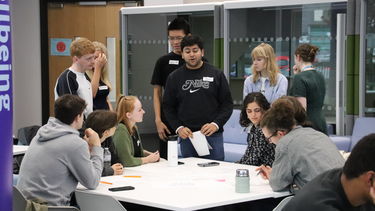Postgraduate
Our masters courses are taught by expert academic researchers. We have 15 postgraduate taught courses available across the School of History, Philosophy and Digital Humanities, allowing you to further your knowledge of a discipline you love, or to explore a new subject at a higher level.
Our postgraduate communities
Information
Student profiles
We asked some of our students and graduates to share their experiences of studying at the University of Sheffield, and to tell us what they've ended up doing with their degree.
PhD funding
Advice, support, and feedback on funding applications and research proposals.
Careers
Our students leave university highly skilled, with an understanding of how individuals and societies function, and a strong sense of self.









